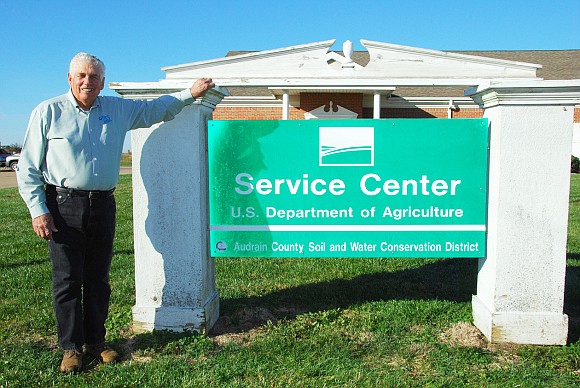MEXICO - There's no telling how much Central Missouri soil Terry Hill has helped people save.
When Hill walked into his office at the USDA Service Center in Mexico on Nov. 20, it represented 50 years since his first day on the job with the USDA's Natural Resources Conservation Service.
Hill manages the offices serving Callaway, Audrain and Boone counties, and he directly or indirectly supervises 15 employees. But early in Hill's career things were different. After a brief stint at his first position at Keytesville, he was transferred to Fayette to open a new office with only himself, sitting at a surplus desk in a storeroom
"I had an old wooden desk, two waste baskets full of forms and supplies, no phone and no vehicle," Hill recalled.
Back then, NRCS was known in those days as the Soil Conservation Service. The service provided only technical assistance, so Hill focused on informing farmers about ways they could reduce gullies and sheet and rill erosion. He took that mindset with him to the Audrain County office where he has worked since 1971.
"Back then I spent a lot of time in the field with landowners," Hill said. "They would come into the office and tell me about their erosion problems, and I would go to their farms and take a look. But we didn't just look at the one field; we would look the whole farm over and I would offer suggestions."
One practice NRCS was promoting at the time was installing a system of terraces that would catch runoff water and send it through drains into underground plastic pipes. The pipes would carry the water to an area at the edge of the field, thus lessening erosion in the field. The problem was Hill couldn't find any farmers willing to try it.
Hill purchased a small farm a few miles outside of Mexico and spent $6,000 of his own money installing a terrace system with the underground outlets. Before the terraces were installed, the field had deep gullies and was producing only six bushels of soybeans per acre.
Once the system was operating, Hill would drive farmers to the field and show them photos of the way the field looked before the terraces. The farmers were so impressed, the practice became popular. A few years later, Hill built his house on the property, which now produces 60 bushels of soybeans per acre on that same field.
Terraces systems and other mechanical practices are still popular, but the focus of protecting and enhancing natural resources has shifted in recent years. Rotational grazing systems and practices like no-till and cover crops that promote soil health and save energy have moved to the forefront.
"The last two or three years, we have evolved into promoting cover crops and soil health," Hill said. "That's really the future for the farmers. Over the years, we helped them solve their major erosion problems, and now they need to make their soils healthier. Back then we were talking about keeping soil in the field. Now we're talking about building the soil up."
Hill said he didn't envision working 50 years when he first joined the agency. His target was about 30-35 years, retiring around age 60.
"But I enjoyed the job and it eventually became 40 years, then 45, and now it's 50," he said.
Currently, the agency helps people help the land by providing financial and technical assistance to help them plan and implement conservation systems. The assistance benefits soil, water, plants, animals and air - basically everything people need to survive. NRCS has offices serving every county. They are staffed with professionals with a wide-ranging set of specialties, and they utilize the newest technology.
Hill isn't sure how much longer he might work, adding he will give retirement some thought in the coming weeks.
"This has been a very enjoyable career," he said. "The most rewarding part has been working with the farmers, helping them solve their problems. It's probably getting to be time to let somebody else have that opportunity, though."
State Conservationist J.R. Flores said Hill's career with NRCS is about so much more than just longevity.
"During his 50-year career with NRCS, Terry has truly encompassed the NRCS Mission of Helping People Help the Land," Flores said. "He has shared his knowledge of conservation with landowners, students, local government officials, service organizations and conservation partners. He also has trained many NRCS and partner employees, ensuring his solid conservation ethic is passed on to all who have had the good fortune of working with him."

